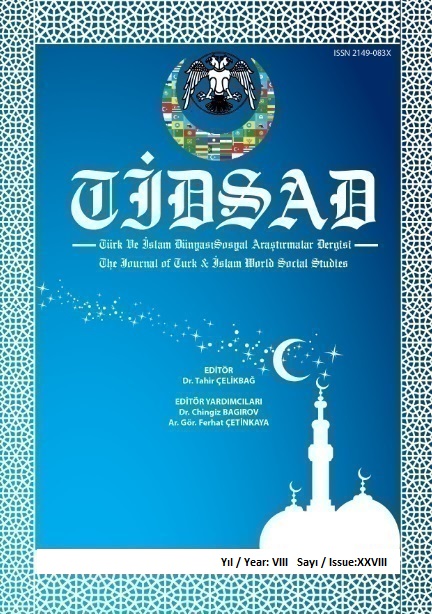Author :
Abstract
Ahilik Teşkilatı, Osmanlı çalışma hayatında esnaf ve sanatkârların bir kuruluşu olarak üretim ve tüketimi kontrol etmiş, usta, kalfa, çırak ilişkilerini baba- evlat ilişkisi gibi candan bağlarla bağlamak suretiyle zanaatı sağlam ahlaki ve mesleki temeller üzerine kurmuştur. Esnaf ve zanaatkârların iyi ve kaliteli mal yapmaları ve üretmeleri birbirleriyle anlaşmazlığa düşmeyecek şekilde düzenlenmiştir. Ahi Teşkilatı Anadolu’da üretim ve pazarlama imkânlarını özendirmiş, aynı zamanda üretimin kalitesini yükseltme, kalifiye usta yetiştirme, iş ve ticaret ahlakına sağlam prensipleri hâkim kılma, işçileri koruma, malları tüketicilere doğrudan ve en ucuz yoldan ulaştırma, karaborsayı önleme işlevlerini de yüklenmiştir. Ahilik Teşkilatı’nın manevi yönü olan prensipleri günümüz açısından önem arz etmektedir. Bu prensiplerden olan eline, beline, diline sağlamlık, kimseyi aldatmamak gibi prensiplerin bugün esnafımıza ve imalat sanayiimizdeki işçi ve işverene aktarılması pek çok psiko-sosyal faydalar sağlayacak, toplum sağlığına önemli katkılar yapacaktır. Bu çalışmada Ahilik Teşkilatı’nın tekelleşmeyi önlemedeki rolü, yardımlaşma sandıkları aracılığı ile gençlerin girişimciliğini teşvik etmesi, esnaf birlikleri olarak çalışanların kötü huy ve davranışlarının engellenmesi ve bunların haksızlığa uğramamaları hususunda kefil olunması ve benzeri uygulamalar ortaya konmuş ve sadece esnafın değil tüm çalışanların modeli olan bu kurumdan alınabilecek ilhamlara temas edilmiştir.
Keywords
Abstract
The Organisation of Akhism, as a foundation of tradesmen and craftsmen, controlled production and consumption in Ottoman work life, and laid the foundations of workmanship on sound moral and professional values by connecting the apprentices, foremen and masters to each other with strong ties just like a father and a son relationship. They formed the work principles of the craftsmen and workmen so well that they could make their goods in a more productive and a qualified way and that they would never face any dispute among themselves. The Akhism Organisation did not only encourage the production and marketing opportunites in Anatolia but also made great endeavours to develop the production quality, raise qualified mastermen, form the etique of work and trade life with sound principles, protect the labourers’ rights , transporting the goods to the consumers directly for the cheapest price and prevent the black marketing. Those spiritual principles of the Akhism Organisation based on moral values have still a great importance in our life today. I believe that transferring the two of those sound principles of the Akhsim as keeping the use of their tongues, hands and manhoods under control , and not deceiving anybody to the present generation of craftsmen, employers and employees working in the production sector will provide them with a lot of psycho-social benefits and thus contribute a lot to the general heath of society as well. This study mainly aims at indicating the role of the Organisation of Akhism in preventing the monopolisation , encouraging the entrepreneurship of the youngsters, preventing the employees of the unions of tradesmen and craftsmen from undesired bad temperamental and behavioral attitudes, and being proxy with them not to face any injustice and some sorts of other similar applications. Does it not only deal with the tradesmen and the craftsmen from the general point of view but it also tells us that there are inspirational lessons to be drawn from this Organisation as the model role for all employees .
Keywords
- Aynural, S. (1996). Yüzyıllarda Osmanlı Esnafında Üretim Anlayışı ve Organizasyonu. İ.Ü. İktisat Fakültesi Mecmuası, 46(38), 13–93.
- Bosnalı, Ö. (1986). Osmanlı Devleti’nde Ahilik Teşkilatı ve Çalışma Hayatı. Yayınlanmamış Yükdek Lisans Tezi, İstanbul Üniversitesi Sosyal Bilimler Enstitüsü.
- Bulut, E. (2009). Anadolu Selçuklu Devleti Zamanında Kurulan Sosyal Müesseselerin Devlet Yönetimine Etkileri. Yayınlanmamış Yüksek Lisans Tezi, Kafkas Üniversitesi Sosyal Bilimler Enstitüsü.
- Çağlar, K. (2020). Osmanlı Payitahtın İaşesini Nasıl Temin Ediyordu. Yedi Kıta Dergisi, 143.
- Ekinci, Y. (1989). Ahilik ve Meslek Eğitimi. Milli Eğitim Bakanlığı Yayınları.
- Hamitoğulları, B. (1986). Ahiliğin Çağdaş Türkiye Bakımından Önemi ve Değerlendirilmesi, Türk Kültürü ve Ahilik. XXI. Ahilik Bayramı Sempozyumu Tebliğleri.
- Koyulhisarlıoğlu, O. (1983). Osmanlı İmparatorluğunda Lonca Derneklerinde Yardım Sandıkları. Yeni Gözlem Dergisi.
- Solak, F. (1999). Ahilik. Mimar ve Mühendis Dergisi, 26.
- Tabakoğlu, A. (1997). Osmanlı Ekonomisinin Temelleri. İlim ve Sanat Mecmuası, 44.
- Ulutan, B. (1986). Ahiliğin Ekonomik Önemi, Türk Kültürü ve Ahilik. XXI. Ahilik Bayramı Sempozyumu.
- Ulutan, B. (1998). Ekonomik Kalkınma ve Devlet Yönetimi. Ahilik Araştırma ve Kültür Vakfı Yayınları.





